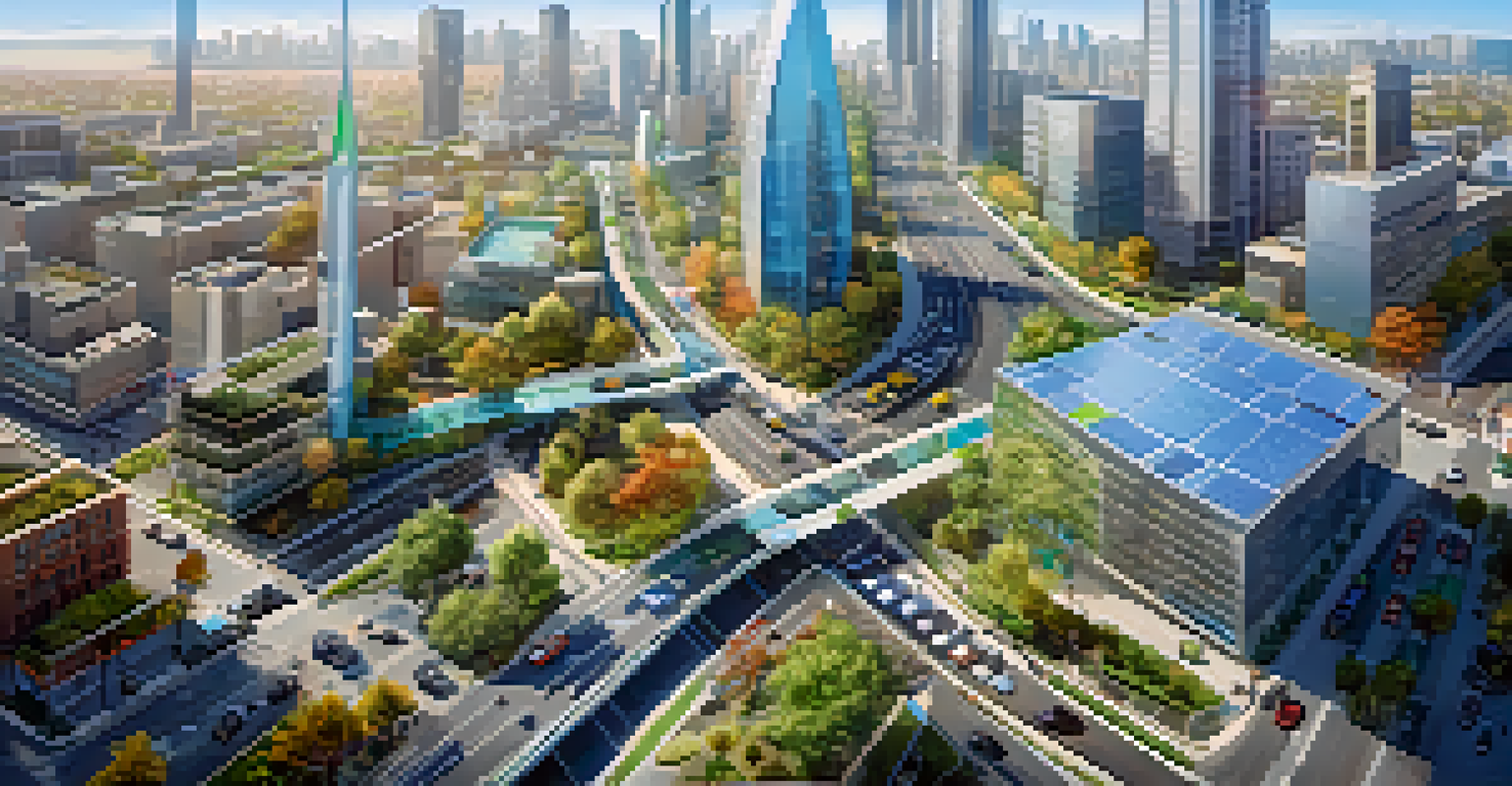5G and Smart Cities: Building the Future of Urban Living

Understanding 5G Technology and Its Benefits
5G, or fifth-generation wireless technology, is the latest advancement in mobile networks. It offers significantly faster speeds, reduced latency, and the ability to connect a vast number of devices simultaneously. This leap in technology paves the way for innovative urban solutions that enhance everyday life.
The future will be about connectivity, a seamless interconnection of everything from our personal devices to our urban infrastructure.
Imagine downloading a full-length movie in seconds or having real-time communication with smart devices around you. 5G makes these scenarios possible, creating an environment where cities can function more efficiently and responsively. The potential impact on urban infrastructure is enormous, touching everything from traffic management to public safety.
As cities adopt 5G, they can implement smart technologies that improve services and sustainability. For instance, smart traffic lights can adapt to real-time conditions, reducing congestion and enhancing the overall flow of urban life. This innovation not only saves time but also contributes to a greener environment.
The Role of Smart Cities in Urban Development
Smart cities utilize technology and data analytics to improve the quality of life for residents. They aim to create urban areas that are more efficient, sustainable, and livable. By integrating systems such as energy, transportation, and communication, smart cities can respond dynamically to the needs of their inhabitants.

For example, smart waste management systems can optimize collection routes based on real-time data, reducing operational costs and environmental impact. This intelligent approach to urban planning ensures that resources are used effectively, enhancing the overall experience of living in the city.
5G Boosts Smart City Efficiency
5G technology enhances connectivity and enables real-time communication between devices, improving urban services and infrastructure.
Moreover, smart cities often engage with their residents to co-create solutions that meet community needs. This collaborative approach fosters a sense of belonging and encourages civic participation, ultimately leading to stronger, more resilient urban environments.
How 5G Enhances Smart City Connectivity
Connectivity is the backbone of any smart city, and 5G takes this to the next level. With its high-speed data transmission capabilities, 5G enables a seamless connection between various smart devices and applications. This interconnectedness is crucial for the smooth operation of urban systems.
Smart cities will require a new mindset, one that embraces technology and innovation as tools to enhance the quality of life for all citizens.
Consider the integration of smart public transportation systems that use 5G to provide real-time updates to commuters. Passengers can access information about bus arrivals, delays, and routes right from their smartphones. This not only improves the commuting experience but also encourages the use of public transport, reducing traffic congestion.
In addition, 5G facilitates the deployment of Internet of Things (IoT) devices throughout the city. From smart streetlights that adjust brightness based on pedestrian presence to environmental sensors monitoring air quality, this technology creates a more responsive urban landscape.
Smart Infrastructure: Building Resilient Cities
As cities continue to grow, the need for resilient infrastructure becomes increasingly important. Smart infrastructure, powered by 5G, allows for constant monitoring and maintenance of essential services such as water supply, energy grids, and transportation networks. This proactive approach helps prevent issues before they escalate into larger problems.
For instance, sensors embedded in roads can detect wear and tear, alerting maintenance crews to address issues promptly. This efficiency not only saves money but also minimizes disruptions to daily life. Residents benefit from fewer road closures and enhanced safety.
Sustainability Through Smart Solutions
Smart cities leverage 5G to implement eco-friendly technologies that reduce carbon footprints and optimize resource use.
Furthermore, smart infrastructure contributes to sustainability goals by optimizing energy usage and reducing waste. With real-time data, cities can implement energy-efficient solutions that adapt to changing demands, ultimately leading to a more sustainable urban environment.
Public Safety and Security in Smart Cities
Public safety is a top priority for any urban area, and 5G technology enhances safety measures in smart cities. By enabling advanced surveillance systems and emergency response protocols, cities can ensure a quicker response to incidents. This proactive approach helps protect residents and maintain community trust.
For example, smart cameras equipped with AI can analyze footage in real-time, identifying potential threats or unusual behavior. This not only aids law enforcement but also enhances community safety. Residents can feel more secure knowing that their environment is actively monitored.
Moreover, 5G supports public safety applications that provide real-time alerts during emergencies, such as natural disasters or public health crises. With instant communication capabilities, cities can keep residents informed and safe, enhancing overall resilience.
The Environmental Impact of 5G and Smart Cities
One of the most significant benefits of smart cities powered by 5G is their potential to promote environmental sustainability. By leveraging data and technology, cities can implement strategies that reduce their carbon footprint and conserve resources. This is particularly important in the face of climate change challenges.
For example, smart grids can optimize energy distribution based on real-time demand, minimizing waste and lowering emissions. Additionally, smart irrigation systems can conserve water by adjusting usage based on weather forecasts and soil conditions. These technologies contribute to a more sustainable urban ecosystem.
Addressing Challenges of Smart Tech
While 5G and smart cities offer significant benefits, challenges related to data privacy, cybersecurity, and equitable access must be addressed.
Furthermore, smart transportation initiatives, such as electric vehicle charging stations and bike-sharing programs, encourage greener travel options. By integrating these solutions, cities can foster a culture of sustainability, benefiting both residents and the planet.
Challenges Ahead for 5G and Smart Cities
While the benefits of 5G and smart cities are compelling, there are challenges ahead that must be addressed. Issues such as data privacy, cybersecurity, and equitable access to technology are crucial considerations in the development of smart urban environments. Ensuring that all residents can benefit from these advancements is essential for fostering inclusive growth.
For instance, as cities gather vast amounts of data from various sources, they must implement robust security measures to protect sensitive information. Residents need to feel confident that their data is being handled responsibly and securely, which is vital for building trust in smart city initiatives.

Additionally, bridging the digital divide is critical to ensure that all communities have access to the benefits of 5G and smart technologies. This involves investing in infrastructure and education to empower all residents, regardless of their socioeconomic background, to participate in the digital age.